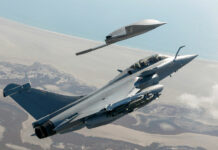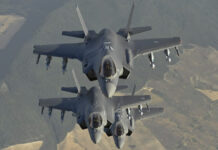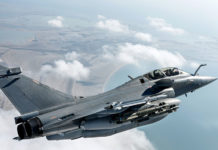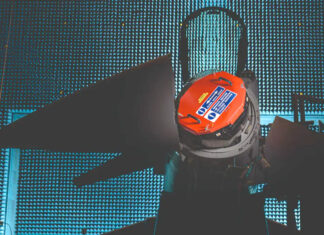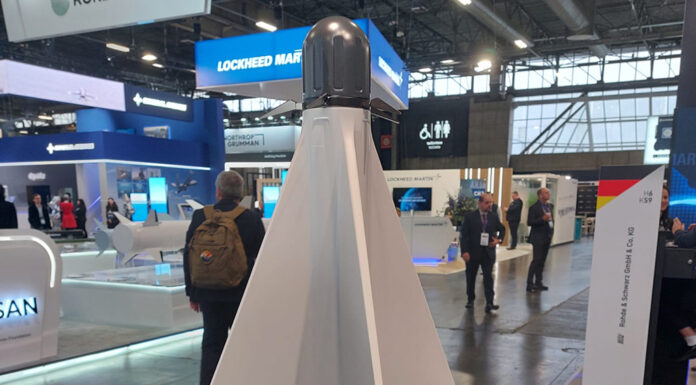Updated: October 21, 2010: The U.S. and Saudi Arabia have finalized an arms package that shadows even the large arms mega-sales in the region. The current program includes several packages worth about $60 Billion, which include mostly platforms produced by the Boeing Company. The main element is the modernization of the Royal Saudi Air Force, with the acquisition and modernization of more than 150 F-15S/SA fighters as part of a $30 billion multiyear investment. This package includes the acquisition of 84 new F-15SA fighter jets, replacing the Kingdom’s aging F-15C/D fighters, and the upgrading 70 existing F-15S strike fighters in service with the RSAF, bringing them to the same level of the new F-15SA.
The new F-15SA and the upgraded F-15S will include the APG-63(v)3 radar from Raytheon, the latest AESA radar developed for the Eagle. These aircraft will also carry the AN/AAQ-33 Sniper Targeting pod and Tiger Eye Navigation Pod (3rd Generation LANTIRN). On reconnaissance missions the DB-110 Reconnaissance Pod will be used. The Saudi acquisition represents the first application of DB-110 on the F-15 platform.
To further improve air combat capability the new Saudi Eagles will be equipped with Joint Helmet Mounted Cueing Systems (JHMCS) and AN/AAS-42 Infrared Search and Track (IRST) Systems. The Saudis will also receive the latest version of the Sidewinder AIM-9X short range air/air missiles and AIM-120C/7 AMRAAM missiles. For air/surface attack the new Eagles will carry mostly precision guided weapons, including AGM-84 Block II Harpoon anti-ship missiles, AGM-88B HARM anti radiation missiles, 500 and 2,000 lb versions of enhanced Paveway II and III Dual Mode Laser/Global Positioning System (GPS) Guided bombs, 2,000 lbs JDAM GPS guided weapons, and CBU-105D/B Sensor Fuzed Weapons (SFW) utilizing Wind Corrected Munitions Dispensers (WCMD).
Apaches for All Services
In addition, the package includes the acquisition of over 180 helicopters for well over $25 billion, equipping a new aviation regiment under the Saudi Arabian National Guard’s new Aviation Command. As part of this package the U.S. will supply 36 new AH-64D attack helicopters, upgrading of existing Apaches, delivery of 36 AH-6 Little Bird light attack helicopters. The package also includes 72 Sikorsky UH-60M Black Hawk assault helicopters and 12 MD530 scout/liaison light helicopters.
The SANG aviation regiment will field 36 AH-64D (Apache Block III) attack helicopters, of which up to 20 will be equipped with mast mounted targeting systems, comprising the AN/APG-78 Fire Control Radars and AN/APR-48A Radar Frequency Interferometer sets. The 36 AH-6i light attack helicopters will carry Wescam MX15Di EO targeting systems, and be armed with GAU-19A 12.7mm Gatling guns and launchers for the firing of AGM-114R HELLFIRE II Missiles.
In addition to the RSNG Apache acquisition the Royal Saudi Land Forces (RSLF) will also invest $3.3 billion acquiring 24 additional Block III Apaches, under a separate order. 10 of these helicopters will be fitted with the mast mounted target acquisition kit. For these gunships the Saudis opted for a weapons mix comprising of AGM-114R Hellfire, 30 mm automatic gun and 70mm laser guided rockets. The helicopters will be equipped with airborne satellite communications terminals. In addition, the Saudi Arabian Royal Guard will also buy 10 Apache Block IIIs, on a third order worth $2.2 billion. The configuration and weapon’s mix on these helicopters is almost identical to that of the Saudi Army.
The Saudis are also interested in fielding missile defense capability although the specific choices of weapons have not been decided yet. The Saudis are planning to integrate both land-based and, potentially, ship borne elements – once the Saudis commit to an adequate platform. Such systems commonly include variants of the SM-3 or THAAD interceptors, and early warning and fire control systems including the TPY-2 radar or TPY-1 AEGIS BMD naval systems. Unlike other countries in the region, the Saudis preferred to invest in modernizing their airpower but delayed the upgrade of their Patriot air defense systems, which could provide limited ballistic missile defense capability.
In recent years Saudi Arabia has bought military hardware from Russia (main battle tanks, helicopters) the U.K., (Typhoon strike fighters). The kingdom is yet to improve its air defense systems (probably, an element in the new package) and naval capabilities. As other Gulf States, Saudi Arabia is bolstering its military power against the growing from Iran. Most of the investments made by the rich Gulf countries were in missile defense and airpower, trusting the U.S. presence in the Persian Gulf to deal with the Iranian naval forces. On the other side of the Gulf, Iran is constantly expanding its naval capabilities and ballistic missile reach, seeking strategic domination of the region, by conventional and unconventional means.

